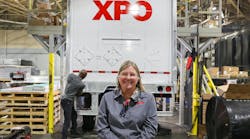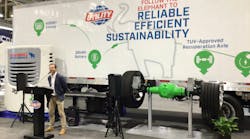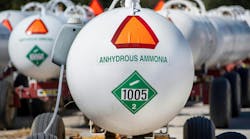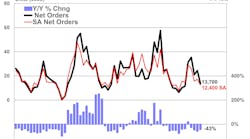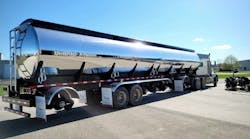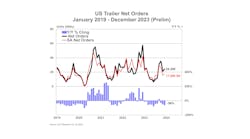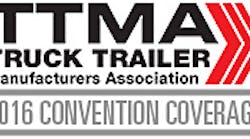Not enough manufacturing executives understand the importance of leaving a legacy for the next generation that provides high-paying manufacturing jobs with benefits, according to Don McNeeley.
“You cannot surrender high-paying manufacturing jobs to greeters at Wal-Mart,” said McNeeley, president/CEO of Chicago Tube and Iron and an adjunct professor at Northwestern University, where he teaches in the graduate program at the McCormick School of Engineering. “You cannot replace $70,000-a-year jobs with $20,000-a-year jobs and expect the economy to continue to evolve.
“You manufacture trucks and trailers. I sell steel. We do not do God’s work. But what we do is far more important than what I think you give yourself credit for. At the end of your life, on your deathbed, you are either going to subconsciously or consciously ask yourself a question: Was your life relevant? Did your existence make society better or worse? Did you make a difference?
“I sit back and do not like the direction of our country. I will be here to guide my daughter’s life, but mathematically won’t be here for half of the lives of my granddaughter or grandson. I want to leave enough money for my kids to do something but not enough to do nothing.
“If you look at the life evolution, you spend the first part of your life learning and then you take what you learn and lead. Then, by the time you’re 60 and grandkids come, you start to leave the foundation for the legacy. In our company, I can train these young men to take just my company and make sure it’s perpetuated for 100 years. But in the classroom, maybe I can do that 30 manufacturing companies at a time. And then you know when it’s time to leave.”
In his presentation, “The Leadership Mind,” he said manufacturing is the key. The steel industry at one time employed 600,000 individuals, but today that number is 100,000. And yet, with 500,000 fewer people, we produce 30% more steel.
“It works against us in Washington because we’re a smaller constituency,” he said. “So each iteration of efficiency you bring to your manufacturing process works against you in the political arena. Isn’t that an interesting paradigm?”
He said there are only three ways to create sustainable wealth in a nation: infant mortality rate, life expectancy, and percent of home ownership.
“Go back to 2007 and 2009,” he said. “We wanted to pump that (home ownership) number up, so we started to give subprime loans and it all imploded. Student loan exposure is over $1 trillion and is 38% non-performing. Remember how we sold houses that they couldn’t afford? Anybody know somebody getting a degree with a non-marketable major and a whole load of debt? It’s not by accident. The only way to create sustainable wealth for a nation is you need to grow something, mine something, build something. This is the basis of the wealth.”
He said it’s extremely difficult to sustain success:
• Only one in 100 private businesses reach its centennial: 44% fail in the first generation, 40% in the second generation, and 15% in the third generation.
• 40% of the S&P 500 turns over every 10 years.
“As you become more expert in your business, you become more micro,” he said. “You begin to get more precise and you really need to step back. The terminology in Wall Street is attribution rate. Something occurred. To what to you attribute it? Attribution: 50% of what happens in your life is determined by the economy, 30% by your sector, and 20% is related to your own company. So if 80% is something out of your control, at least be able to understand it and be able to predict it.”
He said the government is 25% of the economy, so we need to look at what happens with the government.
“What happened to this concept of leader people? There are 435 House of Representative Congressmen and 100 senators, so the Congressional body is 535. What percent of the government no longer exists? If I aggregate those 535, their aggregate net worth is $7.5 billion. Divide by 535 and that’s $13.4 million per person. How representative of that is society? It’s no longer representative.”
• Rich versus poor.
“We hear this concept about the rich getting richer and the poor getting poorer. I do think some people should make more than others. I think people should have more net worth than others. Why? Because they’re smarter, take more risks, and turn money into a business. The rich aren’t getting richer and the poor poorer. The rich are getting richer. The poor are getting richer but the delta is growing, simply because of compounding. Somebody makes $15,000 and somebody makes $150,000. All of a sudden, both are gaining 3% a year. With $150,000, the numerator is going to grow.
“So what’s the solution? I understand minimum wage and supply and demand. The minimum wage is $7 and guys that I’m paying $9 I’m paying $9 because I value him being worth $2 more than minimum wage. And the person making $14 I value that much more. So if you raise the minimum wage, nobody can calculate the ripple effect of what it does to the economy. But I don’t know that anybody in this advanced society should work 40 hours a week and live below poverty. Even if they’re driving a taxi.”
• Wealth quintiles.
“Once you get entrance into a great capitalistic system, don’t you have the opportunity to move up? And if you’re not moving up in this land of opportunity, you need not to look at the government but look in the mirror. We have a shortage of skilled workers. My welders with overtime are making $70,000 a year, but I can’t fill all the jobs. Last year for the first time, I put in the first of two robotic lines. So we have a nation that has a shortage of skilled workers and an abundance of unskilled workers that don’t want to work. So now the question is: Why don’t they want to work? Because the minimum wage is too close to the welfare package. The welfare is too good.”
• China and steel.
“We have 1.6 billion metric tons of steel capacity in the world, but 800 million of that is in China. You use steel. You use metal. You need to be aware of this. China appealed to the World Trade Organization for the right to host the Olympics. The epicenter for the Olympics was Beijing and Shanghai. They took millions of peasants off farms to come to the city and build the infrastructure, not even thinking that at the end of the Olympics, they would return to farms to starve through that.
“Power in Communist bloc country comes with the military. The military in China understood we had this thing called social media. We couldn’t just take the guy from Tiananmen Square and shoot him because you’d have an uprising on social media, so they had to grow the economy double digits for the last 10 years to keep the people working. That’s why there are airports with no planes and cities and housing developments where nobody lives. They were just trying to keep people active, and now they’re slowing down.
“In 2008, steel was $1000 a ton. But just last year I put $600 a ton into my budget. By end of the year, steel had fallen 41%. And in the summer of 2015 it was down to $355.”
He said there are four different kinds of markets:
• Open. “Lower barrier to entrance. Your market is somewhat open but the barrier is it’s capital intensive. You’ve got to have material, a lot of equipment, a lot of skill. But open markets are characterized by a lot of people involved and a low barrier to entrance.”
• Oligopoly. “On the surface, it appears to be an open market but if you really drill down, there are four major players. It’s a little more dangerous for the consumer than an open market.”
• Duopoly. “There are a number of players in there, but true players command 70% of the market. That’s not the case in your industry. Think Coke or Pepsi. Seven out of every 10 beverages sold in the world today are owned by either Coke or Pepsi.”
• Monopoly. “One, uno. Think of your utility. We grant somebody a monopoly and then we put a citizen’s utility board overseeing that.”
“As you go down this list, it becomes more dangerous for the consumer or end user. If steel is a monopoly, I guarantee the price of your manufacturing would go sky high. All textbooks stop there. But could there be anything more dangerous than a monopoly? Yes, a state-owned enterprise (SEO). Their losses are swiped away. There’s no incentive for them to be efficient because the government will write a check. Here’s my problem: 66% of the world’s steel capacity is state-owned, 34% private/public-owned. So leadership is what you need in your industry.”
Five major shifts you need to be aware of:
• Excess global capacity in most industries, which means a future of compressed margins.
• Globalization. “China sneezed on the first day of January, and our stock market corrected 10%. The other side of the world affects every market.”
• The Internet destroys some industries.
• Increase in non-product cost (i.e. healthcare, regulation, pension, taxes, and litigation). The US becomes non-competitive to global alternatives.
• Demographic. Hispanic and
Asian buying habits must be considered.
TTMA survival goals:
• Quality and service must be equal to or different than alternatives.
• Product cost structure must be equal to or better than competitors. “If you’re in America, you’re already at a disadvantage. Why? $17 trillion dollar GDP. And 13% of our GDP is regulatory compliance.”
• Make certain that your customers are going to survive. “When you go back home, your second-largest asset is receivable.”
• New product development, or cutting back existing product lines.
McNeeley cited a quote from Albert Einstein: “We cannot solve our problems with the same thinking we used when we created them.” ♦
